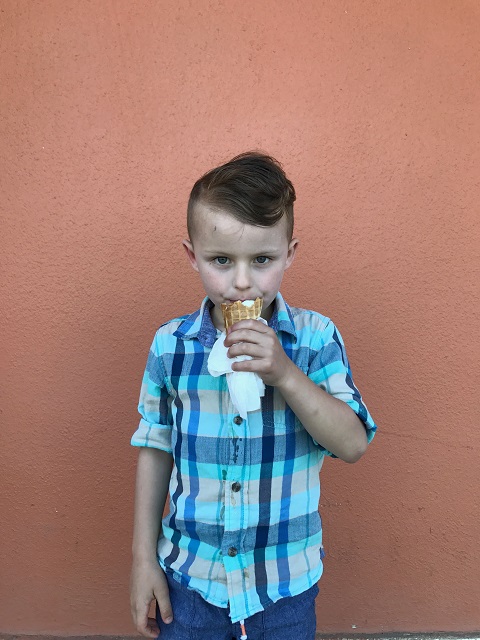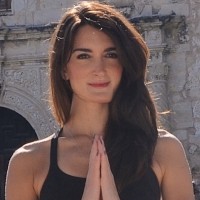I drive up in the carpool lane at school.
In the backseat, my son is pulling the hood of his sweatshirt over his head and checking himself out in the rearview mirror. He unfastens his seat belt and kisses me on the cheek.
“There’s an entire world out there, Mom,” he says.
“Yes, there is,” I say.
These comments no longer startle me, as this has been his language since he was able to speak. My deep-feeling, compassionate yet humorous, Vonnegut-esque son with a quirky sense of humor does not speak to his cohorts like this, but out into a world that awaits his overly aware, sensitive self.
He jumps out of the car, flashes me the peace sign, and says, “I’m going to do something great today. I’m going to help someone.”
And before I can say the lines I was taught to say, like “take care of yourself” or “focus on your work,” he has already entered the school and the doors have closed behind him.
When he was three, he went to a “mother’s day out” program. “He is different,” the teachers said. “We ask him if he is a boy or girl, and he says, blue.”
He talked in metaphors and deviated from questions to share with others the imaginary world of Legos he built at home. He was not diagnosed as having any sort of learning disability, but was labeled “special,” “unique,” and “different”—and to my ears, it wasn’t all that good.
When he was four, the teacher said, “He is like a little Gandhi. He seeks out the person playing alone and befriends that child. He tells jokes to make his classmates laugh. He seems less concerned with his schoolwork and more concerned with the good of the group.”
That’s a good thing, I thought. Only the other children were racing by him, learning their phonics, the alphabet in Spanish, and basic math skills, while he fixated on everyone having a harmonious day.
In a world where we must fit in somewhere, I worry about my child.
I tell him to stand up for what is right, and then I see him stand alone. Being a writer, dancer, and yoga teacher, I am surrounded by a certain population of kind-spirited, like-minded artists who put balance, health, and spirituality at the forefront of their lives. Although I encourage my son to kick a ball, swim, and make a new friend—he prefers making books, building Legos, playing with his brother, and thinking of ways to save the world.
While the other boys are throwing a ball, my son has taped hundreds of pages of his artwork on the walls of our home. He is writing a book on what it will be like to be president. The first page says he will make sure there are no mean people.
When my son saw some kids bullying another child, he came home furious. “There are mean kids at school,” he said.
“There are mean people in this world,” I responded. Then, I asked out of my motherly instinct, “Did they bother you?”
“Does it matter, Mom? I saw them hurt another person with my own eyes.”
And then we talk about injustices in the world—and I remind myself he is seven. And I try to talk to him on his level, but his questions escalate to deeper, broader topics.
What I want my son to know is this: He is not alone. He is not different.
He is the same as any other boy born into this world, only these other boys’ parents—or teachers, or friends, or siblings, or teammates—told him it is more important to fit in than do the right (sometimes awkward and different) thing. It is more important, as a boy, to be tough and strong. It is more important to hide tears, than to shed them freely. It’s more important to stand tall and be proud, than be kind and sensitive or help someone else.
And I am reminded of Vonnegut. “I feel and think much as you do, care about many of the things you care about, although most people do not care about them. You are not alone.”
~
Author: Ashley Martinez
Image: Unsplash/Society Rebel
Editor: Yoli Ramazzina
Supervising Editor 1: Danielle Beutell
Supervising Editor 2: Callie Rushton












Read 0 comments and reply